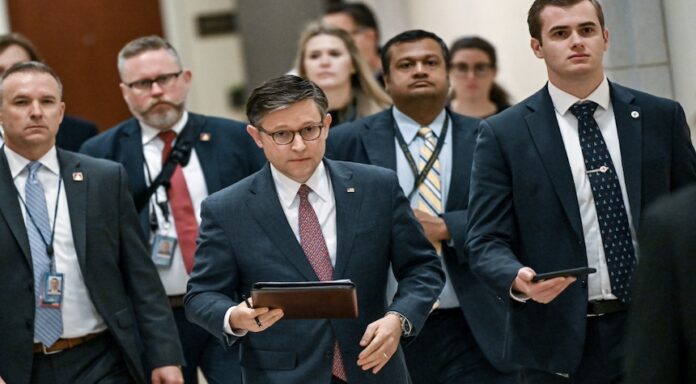House Speaker Mike Johnson, R-LA, explained his plans for foreign aid to Israel and Taiwan during an appearance on CNN’s “State of the Union”. His remarks came amid a heated debate about foreign aid, particularly on the Republican side.
Johnson has faced resistance from the conservatives in the party and clashed over the issue with Freedom Caucus members. The situation is so tense, that Reps. Marjorie Taylor Greene and Thomas Massie have threatened to remove the speaker like what happened with former House Speaker Kevin McCarthy.
Johnson explained in the interview how he planned to divide bills related to foreign assistance into three separate proposals, one for each country. The Speaker stated, “Listen to me. This is a much better policy and process.” “We received the Senate Supplement several weeks ago, and everything was sandwiched together.”
Johnson said that the House should examine each issue “individually” and “on their own merits”.
The Speaker clarified that the national and international aid, as well as aid for Israel, Ukraine, and Indo-Pacific, would be handled separately.

There are four bills. Each person will have the opportunity to vote up or down based on what they think. That’s exactly what they want. Listen, we also made a more effective product, because Ukraine is a controversial topic, as you well know. Jake, what we did in this package was change it. Eighty percent (80%) of Ukraine’s spending is for replenishing American stocks and weapons. This is a very important thing for the U.S. defense and industrial base. This is going to be an important part. We also added some innovations that conservatives find appealing and make sense. For the Ukraine, I’m referring to any assistance that would have been a government loan. Many people thought that was important. We implemented it. Many innovations are here. “I think the product is better in the end.”
Tapper brought to light the threats from Greene and Massie to remove Johnson, a matter that has become more urgent as the debate about foreign aid intensifies. Johnson, instead of directly addressing the matter, recalled that he was the author of the “Commitment To Civility,” in which members agreed to “treat each other with dignity and respect.”

“I don’t hate anyone. I mean, I disagree with my colleagues from the other side about the ideas and legislation. But I do not hate anyone. We’re supposed to respect and honor each other as Americans. This is a quality I consider to be human. It’s all about dignity, I believe. I think we should promote that. It saddens me to see how the institution has deteriorated, but I believe we can restore it. Jake, I’m an optimistic person. “I’ve always been an optimist.”
Tapper brought the threats up again later in the interview. Johnson replied that he was “not focused” on the threat and he “was focused on my job”.
Tapper asked Johnson why the House Republicans had not pushed for aid to Ukraine months earlier. He said that Ukraine was in desperate need of aid.
Johnson said that it takes time to build consensus and socialize when you have the smallest U.S. majority in history, but he confirmed his commitment to support Ukraine and Israel.
We know the timeline. We understand the urgency of the situation in Ukraine and Israel. We will stand with Israel, our dear friend and close ally, we will stand up for freedom, and we will make sure that Vladimir Putin does not march across Europe. These are important responsibilities.”
House Speaker Mike Johnson when asked about aid to Ukraine and Israel:
“We are going to stand by Israel, our close ally and dear friend, and we’re going to stand for freedom and make sure that Vladimir Putin doesn’t march through Europe.” pic.twitter.com/rjCjvsYvHv
— Jeff Charles, An Awful Pundit🏴 (@jeffcharlesjr) April 17, 2024
Tapper also pointed out conservative Republican legislators, noting some wanted border security addressed in legislation. Johnson replied by saying that he was “operating with a margin of one vote” and that it was the “smallest margin in U.S. History.”
The Speaker was prompted by this margin to ask Democrats for their support to bring the foreign aid packages to the floor of the House for a vote.
“We need to get the votes in the room to pass the rule before we can include it into the package. This is how it works. The rule allows the substantive bill to go on the floor. I don’t think all of my Republicans agree with that rule. That means that the only way I can get it on the floor is to have a few Democrats.”
Johnson did acknowledge that Democrats “are not for border security”, which is why it was necessary to push through two separate packages. One package contains a clause that would reinstate former president Donald Trump’s policy of “Remain in Mexico” while ending the “catch-and-release” system and rebuilding the Wall.
Johnson’s plan continues to be debated by Congress, and it could get even hotter as the Speaker navigates through the foreign aid issue.










